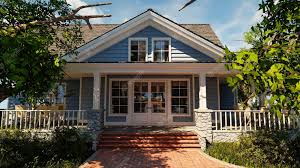
From Coverage to Cost: A Comprehensive Guide to Homeowners Insurance Expenses
As a homeowner, it is crucial to protect your investment and belongings from unexpected events such as fires, theft, or natural disasters. This is where homeowners insurance comes into play. Homeowners insurance provides financial protection against these risks and can alleviate the financial burden that may arise from repairing or replacing your home and belongings. In this comprehensive guide, we will explore the various aspects of homeowners insurance, particularly focusing on the expenses involved.
Understanding the importance of homeowners insurance
Before delving into the costs associated with homeowners insurance, it is vital to understand its importance. A comprehensive homeowners insurance policy not only provides coverage for your dwelling but also safeguards your personal property, offers liability protection, and may even cover additional living expenses if you are unable to reside in your home due to a covered event. Without proper insurance coverage, you could be left facing significant financial losses in the event of a disaster or accident.
Factors that affect homeowners-insurance costs
When it comes to determining the cost of homeowners-insurance, several factors come into play. Insurance companies take into account the age and condition of your home, its location, the amount of coverage you require, your claims history, and even your credit score. For instance, if you live in an area prone to natural disasters or have a history of filing frequent claims, your insurance premiums may be higher. Similarly, an older home with outdated electrical or plumbing systems may pose a higher risk, leading to increased insurance costs.
The deductible you choose also affects your insurance premiums. A deductible is the amount you are responsible for paying out of pocket before your insurance coverage kicks in. Opting for a higher deductible can lower your premiums, but it also means you will have to pay more in the event of a claim.
Homeowners insurance coverage options
Homeowners-insurance policies typically consist of several types of coverage. Dwelling coverage protects the structure of your home, including the walls, roof, and foundation. Personal property coverage provides financial protection for your belongings, such as furniture, electronics, and clothing. Liability coverage safeguards you against legal and medical expenses if someone is injured on your property. Additional living expenses coverage can help cover temporary accommodation and other expenses if your home becomes uninhabitable due to a covered event.
It is essential to carefully review the coverage options provided by different Oregon insurance companies to ensure that you have adequate protection for your specific needs. Consider the value of your home and belongings, as well as any additional risks you may face, such as living in a flood-prone area or owning valuable jewelry or artwork.
The cost of homeowners insurance in Central Oregon
If you reside in Central Oregon, it is important to understand the specific factors that influence homeowners-insurance costs in this region. Central Oregon is known for its beautiful landscapes, but it is also susceptible to natural disasters such as wildfires and winter storms. Insurance companies take these risks into account when determining premiums. Additionally, the cost of materials and labor for home repairs or rebuilding in Central Oregon can be higher than in other areas, which can impact insurance costs.
To ensure you are getting the best possible rates, it is advisable to shop around and obtain quotes from multiple insurance providers. Consider working with an independent insurance agent who can help you compare different policies and find the one that offers the best coverage at an affordable price.
Homeowners-insurance in Bend, Oregon
Bend, Oregon, is a popular city in Central Oregon that offers a high quality of life. However, homeowners insurance costs in Bend can vary depending on factors such as the age of your home, its proximity to fire-prone areas, and the crime rate in your neighborhood. It is essential to discuss these factors with your insurance agent to determine the most appropriate coverage options for your specific needs.
In addition to considering the cost of homeowners-insurance, it is also important to review the reputation and financial stability of the insurance companies you are considering. Look for companies with a strong track record of customer satisfaction and prompt claims handling. Online reviews and ratings from independent agencies can provide valuable insights into the reliability and service quality of different insurers.
Tips for reducing insurance expenses
While homeowners insurance is a necessary expense, there are ways to potentially reduce your premiums without compromising on coverage. Here are some tips to help you lower your homeowners insurance costs:
- Increase your deductible: Opting for a higher deductible can result in lower premiums. However, make sure you have enough savings set aside to cover the deductible in case of a claim.
- Bundle your insurance policies: Many insurance companies offer discounts if you bundle your homeowners insurance with other policies, such as auto or life insurance.
- Install safety features: Installing security systems, smoke detectors, and fire alarms can lower your insurance premiums as they reduce the risk of theft or damage.
- Maintain a good credit score: Insurance companies often consider your credit score when determining premiums. Maintaining a good credit score can help you secure lower rates.
- Review your coverage regularly: As your circumstances change, it is important to review your homeowners insurance coverage to ensure it still meets your needs. You may find that you can reduce coverage in certain areas, resulting in lower premiums.
Common misconceptions about homeowners insurance costs
There are several misconceptions surrounding the costs of homeowners-insurance. One common myth is that the market value of your home determines the amount of coverage you need. In reality, homeowners insurance is based on the cost to rebuild your home, which may be different from its market value. Another misconception is that flood damage is covered under standard homeowners insurance policies. In most cases, flood insurance is a separate policy that needs to be purchased separately.
It is important to educate yourself about these misconceptions and consult with an insurance professional to ensure you have a clear understanding of what is covered and what is not under your homeowners insurance policy.
Finding the right homeowners insurance policy for your needs
Finding the right homeowners insurance policy involves careful consideration of your specific needs and priorities. Start by assessing the value of your home and belongings, as well as the risks you face in your area. Research different insurance companies and obtain quotes from multiple providers. Consider factors such as coverage limits, deductibles, and the reputation of the insurer. Working with an independent insurance agent can also be beneficial as they can provide unbiased advice and help you navigate through the various options.
Remember, the cheapest policy may not always be the best option. It is important to strike a balance between affordability and adequate coverage to ensure you are adequately protected.
Get A Homeowners Insurance Quote!
Homeowners insurance is a crucial aspect of protecting your home and belongings from unexpected events. Get an homeowners insurance quote by calling (541) 318-8835 or click here!



